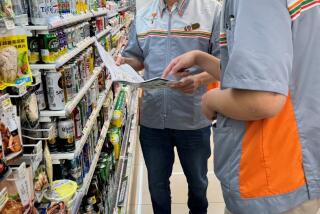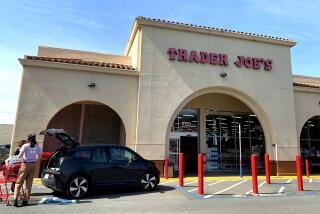After panic buying, Chinese seek refunds on salt
The panic buying of salt that swept China last week amid fears of radiation from Japan has been replaced with a new frenzy: how to get a refund.
Many shoppers now reportedly feel buyers’ remorse after realizing that there was no shortage of salt in China and that radiation from the crippled Fukushima Daiichi nuclear plant in northeastern Japan posed little threat to coastal sea salt deposits.
The hoarders are now lining up at grocery stores to ask for their money back, especially from shopkeepers who charged as much as 10 times the normal prices for the seasoning, according to Chinese news reports.
“I regret it very much. I will never behave this silly anymore,” a woman who bought enough salt to last her four years told the West China City News in Nanjing. She was denied a refund.
A local television station in southern Yunnan province interviewed a farmer standing next to a 110-pound sack of salt he had bought that turned out not to be edible. It also wasn’t returnable.
“I wouldn’t need the [$75] back if I could eat it,” the farmer said.
At a high-end Ole Supermarket in Hangzhou, a line formed for returns Saturday. Refunds were given for about 100 bags of salt and a bottle of soy sauce. Some buyers apparently resorted to soy sauce after stores ran out of salt.
There was no such luck for shoppers at mega-chains Wal-Mart and Carrefour.
“We can’t offer refunds on food products,” said a store employee at a Beijing Wal-Mart on Monday. She gave only her last name, Jin.
National sales of salt peaked Thursday at 370,000 tons, as many supermarkets were emptied of the product, according to the China Daily, a state-owned newspaper.
Though it was initially thought that shoppers were buying iodized salt, confusing it with the iodine that helps ward off the effects of radiation, many interviewed said they were buying it simply because they saw so many others snapping it up.
The government then launched a massive crackdown on hoarding, price-gouging and rumor-mongering.
By Saturday, nationwide sales had dropped to 82,000 tons, though that’s still far more than the daily norm of 15,400 tons.
Police in Hangzhou announced that they had arrested a man who allegedly spread rumors on the Internet about radiation from the Japanese nuclear plant polluting China’s coastal waters. The man was sentenced to 10 days in jail and fined $76, the New China News Agency reported.
The last time China faced similar panic buying was during the SARS epidemic in 2003, when bottles of vinegar, believed to prevent the deadly respiratory disease, flew off the shelves.
More to Read
Start your day right
Sign up for Essential California for news, features and recommendations from the L.A. Times and beyond in your inbox six days a week.
You may occasionally receive promotional content from the Los Angeles Times.







